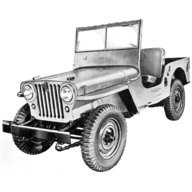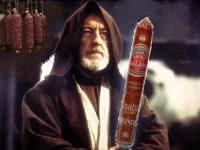
Favorite thermometers
#1

Posted 22 August 2009 - 10:03 AM
#2

Posted 22 August 2009 - 11:42 AM
#3

Posted 22 August 2009 - 11:51 AM
Do explain...They will cost more, but you may want to look into getting a thermocouple.
#4

Posted 23 August 2009 - 06:31 AM
Do explain...
#5

Posted 23 August 2009 - 09:08 AM
I have one of these. The problem wasn't that the probe wire broke, but unstead that the probe got immersed in liquid. You would think they are waterproof looking at them, but they are not. I wrote to the manufacturer and they sent me a replacement probe. I've been using for over a year now making sure when I stick it in water, wort or mash that the probe tip is immersed, but never up to the junction with the braided wire.I was just wondering what everyone's favorite thermometers to use are? I'm about to re-build my system, and need to invest in a digital thermometer. The one's at Bed, Bath, and Beyond with the long wire probe tend to break for some reason (I've had 2 break on me).
#6

Posted 23 August 2009 - 12:45 PM
#7

Posted 23 August 2009 - 04:51 PM
#9

Posted 24 August 2009 - 07:46 PM
Nice find.....I may get a couple of those.....how precise are they??.....can you mash knowing you are at 153F and not 155F???.....I am all about reproducability (the hobgoblin of a tiny mind I guess).....Even with shipping these are a great deal. I find them to be pretty accurate too.Just be certain a Total Immersion is what you want. Also, don't set a converted Sanke HLT on one though - had to order a couple today.
#10

Posted 24 August 2009 - 07:59 PM
Well, sometimes you get what you pay for, sometimes you don't. I've been brewing for a while and have brewed a lot. I think these are a good value. OTOH, by the time you have determined that the mash is at 153df it's almost done anyway. It takes a while to let the temp equalize and some think that most of the good stuff already happened in the first 20 minutes. One school of thought is it takes at least 10 minutes to get an accurate settled in reading. Just throwing stuff out to discuss..........Nice find.....I may get a couple of those.....how precise are they??.....can you mash knowing you are at 153F and not 155F???.....I am all about reproducability (the hobgoblin of a tiny mind I guess).....
#11

Posted 24 August 2009 - 08:00 PM
#12

Posted 24 August 2009 - 09:13 PM
#13

Posted 24 August 2009 - 11:00 PM
#14

Posted 25 August 2009 - 05:22 AM
DJ,I agree, it has been my experience that with each temperature step it takes ~10 minutes to equilibrate the temp between the center of the mash and the recirculating wort output in my RIMS system.....but early this spring I also found that my thermometers (I have them on the HLT, mash tun, and a thermocouple for the RIMS control) were in need of calibration.....three batches in a row finished quite sweet, with a high FG.....I tracked the problem back to the thermometers being off by ~4F.....so while I THOUGHT I was mashing at 151F, I was actually mashing at 155F. The difference was not subtle!!We have all heard it before, but temperatures make a BIG difference.....we need to make sure we are measuring them correctly.Well, sometimes you get what you pay for, sometimes you don't. I've been brewing for a while and have brewed a lot. I think these are a good value. OTOH, by the time you have determined that the mash is at 153df it's almost done anyway. It takes a while to let the temp equalize and some think that most of the good stuff already happened in the first 20 minutes. One school of thought is it takes at least 10 minutes to get an accurate settled in reading. Just throwing stuff out to discuss..........
#15

Posted 25 August 2009 - 05:30 AM
I have a lab grade mercury thermometer that I use to check the cheapo Nova-Techs with. FWIW I've probably been through 4 of them and they have all matched the lab thermo spot on for brewing temperatures.DJ,I agree, it has been my experience that with each temperature step it takes ~10 minutes to equilibrate the temp between the center of the mash and the recirculating wort output in my RIMS system.....but early this spring I also found that my thermometers (I have them on the HLT, mash tun, and a thermocouple for the RIMS control) were in need of calibration.....three batches in a row finished quite sweet, with a high FG.....I tracked the problem back to the thermometers being off by ~4F.....so while I THOUGHT I was mashing at 151F, I was actually mashing at 155F. The difference was not subtle!!We have all heard it before, but temperatures make a BIG difference.....we need to make sure we are measuring them correctly.
#16

Posted 25 August 2009 - 06:32 AM
That said, you can also spend $300 on a crappy thermometer. I've got dials and digitals that I use for commercial brewing since I can't reach the mash with my arm, but I consider my homebrewing setup to have an advantage since it's small enough for me to use my trusty lab thermo.I feel like temp control is something you shouldn't cheap on...
#17

Posted 25 August 2009 - 07:28 AM
In your commercial brewing experience, how often do you calibrate your dials and digitals??Given the experience I had with homebrew size batches and thermometers which had drifted out of calibration, I am thinking I need to pay attention and calibrate them more often than the NEVER that I was doing it <G> ..... BUT I acknowledge that I run the risk of getting TOO compulsive about stuff sometimes.That said, you can also spend $300 on a crappy thermometer. I've got dials and digitals that I use for commercial brewing since I can't reach the mash with my arm, but I consider my homebrewing setup to have an advantage since it's small enough for me to use my trusty lab thermo.
#18

Posted 27 August 2009 - 08:30 PM
#19

Posted 28 August 2009 - 05:01 AM
I fully agree. I underlet the strike water which I think helps reduce the amount of doughballs and really stir the mash well once I get my approximated volume of water in the mash. I still get varying temp readings from one side of the tun to the other. I am now using two thermocuoples that are fed into my PIDs and they both agree with one another.I'm with dj on this one, it takes about 10 good minutes for the temps to equalize.OTOH, by the time you have determined that the mash is at 153df it's almost done anyway. It takes a while to let the temp equalize and some think that most of the good stuff already happened in the first 20 minutes. One school of thought is it takes at least 10 minutes to get an accurate settled in reading. Just throwing stuff out to discuss..........
0 user(s) are reading this topic
0 members, 0 guests, 0 anonymous users











